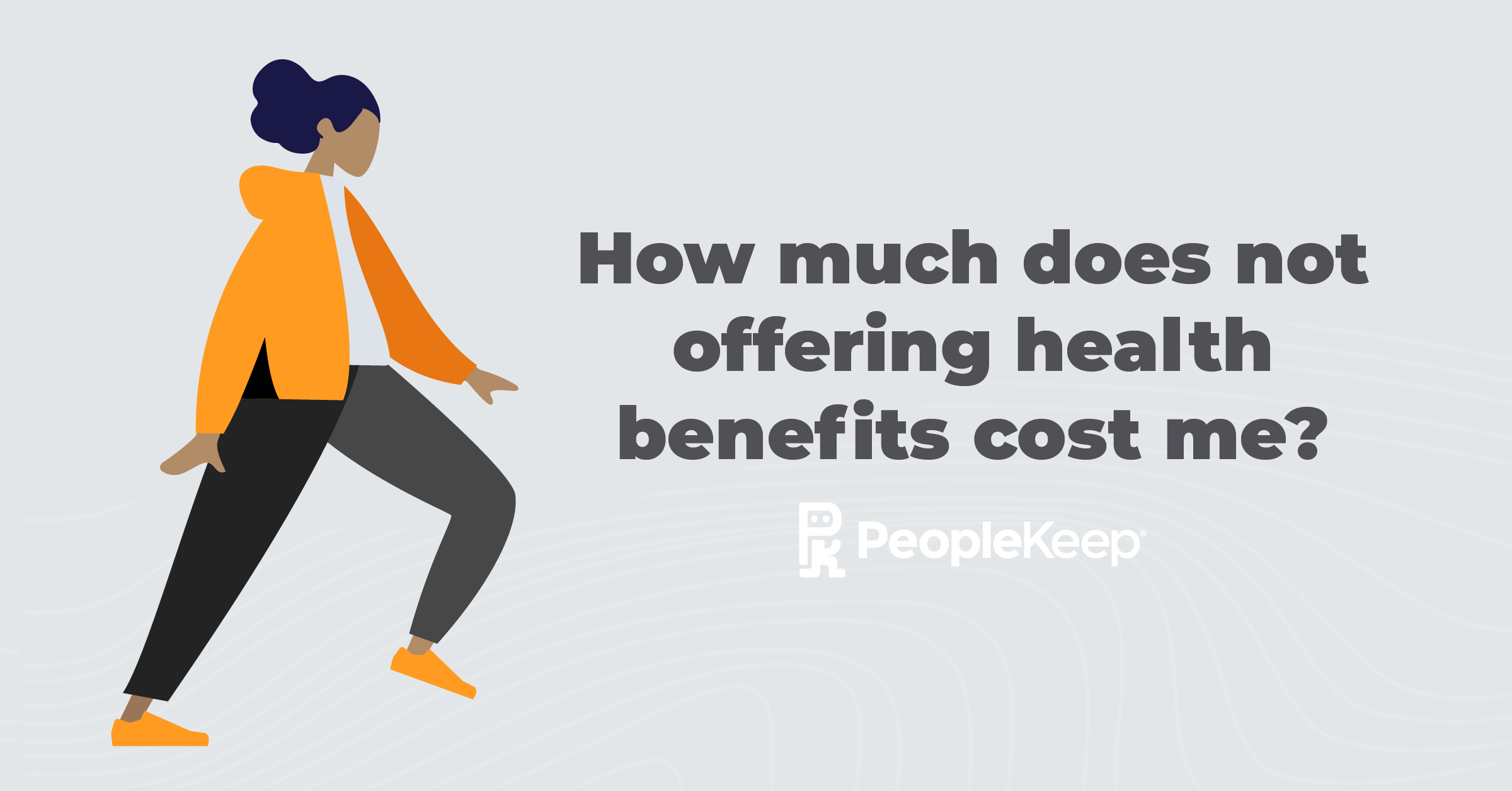How to offer health insurance to multi-state remote workers
By Elizabeth Walker on August 22, 2024 at 6:01 AM
Offering a comprehensive benefits package with health insurance is critical to having engaged and satisfied employees. But if your team includes some of the 22 million U.S. adults who work remotely, you may find it challenging to find a health plan that works1.
Plan types, health insurance providers, policy costs, and regulations vary by state. These inconsistencies can make it difficult for small employers with remote workers in multiple states to find a suitable health benefit. So what’s the solution?
In this article, we’ll discuss three comprehensive health benefits that can work for your remote employees, regardless of their state.
In this blog, you’ll learn:
- Various health insurance options for a remote workforce and the pros and cons of each.
- The difficulties of traditional group health insurance in supporting remote employees’ unique needs.
- How health reimbursement arrangements (HRAs) and health stipends can work as alternatives to traditional benefits.
Option one: Traditional group health insurance for remote, multi-state employees
Traditional group health insurance is a popular option for employers. With this benefit, you choose your company's group health plans and split the cost with your employees. You can buy group health coverage directly through a health insurance carrier. If you need help navigating plan options, you can also use a licensed agent or broker.
There are four standard group policy options:
- Health maintenance organizations (HMOs)
- Preferred provider organizations (PPOs)
- Exclusive provider organizations (EPOs)
- Point of service (POS) plans
Traditional group health insurance may seem like the obvious choice for remote workers. But it’s not always the best option.
Sometimes, your chosen insurance carrier may only operate in some states or counties. So, if you have remote workers across the U.S., they may not all be able to get coverage. Even if they can all secure medical coverage, they may have inconsistent experiences.
They typically can only enroll in a PPO plan, and their network providers and covered medical services will all vary. This lack of uniformity may result in low morale, poor job satisfaction, and high turnover.
If you’re determined to provide your remote team with group health insurance, there are two options:
- Multi-state plans: These plans support employees regardless of their state. If you select a multi-state plan, you’ll be able to work with one carrier that will take care of managing different state regulations. But, few insurance companies offer multi-state plans. There are limited policy options, and premium costs are expensive.
- Separate state plans: If you have a multi-state workforce, you can offer separate group plans to each of them. This lets you choose plans that better fit your employees’ locations and needs. For help, you can use a state-based marketplace, the Small Business Health Options Program (SHOP) Marketplace, or a local broker to find plans. While this option is personalized, it can be time-consuming.
- For small employers, splitting up your workforce this way may mean you won’t meet each plan’s minimum participation requirements.
Group plans have other challenges for small employers. If you have a limited budget, group plan premiums and annual rate hikes may not be doable. They also have minimum participation requirements that you may have trouble meeting. Lastly, they require you to understand annual plan renewals, costs, and policy changes, which can be hard to keep track of.
If you don’t think group health insurance is right for you or your remote workers, the following innovative solutions may be better.
Option two: Health reimbursement arrangements (HRAs)
Your best option for supporting your remote workers is a health reimbursement arrangement (HRA). An HRA is an employer-funded health benefit that allows you to reimburse employees tax-free for health insurance premiums and qualified out-of-pocket medical costs.
There are several different types of HRAs. But they all follow a basic structure. You set a monthly allowance that your employees can use for medical care. Once they make an approved purchase, you reimburse them up to their set allowance amount. Because HRAs are employer-owned, unused funds stay with you if an employee leaves your company.
HRAs are a flexible solution for employers of all sizes, locations, and budgets. They can help you attract and keep talented workers. But it’s essential to pick the right HRA for your business.
Let’s look at two types of HRAs that can work for remote employees:
- The qualified small employer HRA (QSEHRA)
- The individual coverage HRA (ICHRA)
Qualified small employer HRA (QSEHRA)
The QSEHRA is for organizations with fewer than 50 FTEs that don't offer a group health or ancillary plan. With a QSEHRA, your remote employees can buy their own individual health insurance policy. Once they’ve selected a plan that works best for them, you’ll reimburse them for their premium.
You can also choose to reimburse them for other out-of-pocket healthcare expenses. This flexibility makes it easy for all your remote workers to get the comprehensive coverage they need.
Here is more information about the QSEHRA:
- You get to define the allowance you want to offer your employees. Employees can use less than their total monthly allowance, but they can’t exceed it. That means you will have a predictable maximum monthly cost for your health benefit.
- You must offer the benefit on equal terms to all your W-2 full-time employees. Part-time employees can also participate as long as they receive the same allowance as your full-time workers.
- Employees must have a healthcare plan that provides minimum essential coverage (MEC) to use the QSEHRA.
- While it has no minimum contribution limits, the IRS sets annual maximum limits.
- You can design your benefit to reimburse your employees for health insurance premiums only or their premiums plus qualified out-of-pocket costs. You can also vary allowance amounts by age or family status.
- Employees who qualify for premium tax credits can still participate in the QSEHRA. If their allowance is considered affordable, they will have to decline any available tax credits. If not, they will have to adjust the number of tax credits they claim based on their allowance.
The simplicity and affordability of a QSEHRA make it an excellent solution for small businesses seeking a quality alternative to group health plans.
Individual coverage HRA (ICHRA)
Your next option is an ICHRA. The ICHRA works like the QSHERA. You can reimburse employees for individual health insurance premiums and out-of-pocket expenses. But, there are a few notable differences. For example, it’s available for organizations of all sizes and has no maximum contribution limits. So not only can it support your remote employees, but it’s flexible enough to meet any employer’s needs.
Below are more highlights about the ICHRA:
- You can customize this benefit by offering different allowance amounts to your workers based on 11 job-based employee classes, such as seasonal, salaried, and geographic location.
- The ICHRA can’t coordinate with premium tax credits. Employees can opt in or out of the benefit based on affordability.
- Eligible employees must have a qualified individual health insurance plan that meets MEC to participate in the benefit. This means employees on a family member's group plan or an alternative plan, like a healthcare sharing ministry, can't access the benefit.
- You can offer both group insurance and an ICHRA. For example, you can offer a group plan to your in-office employees in one state. Then, you can offer an ICHRA to your remote workers who live in another state. But you can’t give your employees the choice between what benefit they would prefer.
- If your small business becomes an applicable large employer (ALE), you’ll be subject to the employer mandate. If this happens, you can design an ICHRA to satisfy the mandate instead of purchasing costly group health insurance.
Option three: Health stipends
Another way small businesses can provide health benefits to their remote workers is through a health insurance stipend. A stipend is essentially an increase in an employee’s salary. An employer provides a fixed amount of money to their employees, and employees use it how they choose. Unlike a group plan or an HRA, a stipend is not a formal health benefit.
With a stipend, you can offer your employees money to pay for health plan premiums and other out-of-pocket expenses. However, employers can’t require employees to use their stipend on healthcare items. They also can’t ask them to prove they purchased a medical plan.
Below are a few more features of health stipends:
- Stipend contributions are subject to income taxes for employees and payroll taxes for employers.
- Stipends are suitable for remote workers, part-time employees, 1099 contractors, freelancers, and international employees.
- Employees can receive their stipend and collect their full premium tax credit or other healthcare subsidy.
- Stipends have no minimum or maximum contribution limits. So employers can offer their employees as much money as their budget allows.
- You can offer a health stipend alongside other employee benefits, like an HRA or traditional group health insurance.
Employee stipends are enticing for small employers who don’t want to deal with the administrative tasks or costs of group health insurance benefits. They can help employees with their healthcare costs regardless of location. However, an HRA is often the better option because stipends aren’t a formal benefit.
Conclusion
As more companies go remote, their benefits packages must also adapt. Selecting a health benefit for your remote, multi-state workforce has unique challenges. But if you research your options and understand what your remote workers want, you can offer the best benefit possible and improve recruitment, retention, and satisfaction.
If you’re ready to offer personalized health benefits to your remote workers, PeopleKeep can help! Our HRA administration software can support your entire team, no matter where they live. Better yet, you can design and manage your benefits in minutes per month, saving you time and money. Book a demo with an HRA specialist to get started!
Check out more resources
See these related articles

How much does not offering health benefits cost me?
Not offering employee health benefits can cost you in turnover, recruitment, and productivity. Learn the financial risks and smarter benefit alternatives.

What is healthcare reimbursement?
Looking to reimburse your employees for their healthcare expenses? Learn everything you need to know about healthcare reimbursement.

Can I offer a health insurance stipend?
Thinking about offering a health insurance stipend? Learn how it works, when it’s allowed, and why HRAs may be a more compliant alternative for employers.



